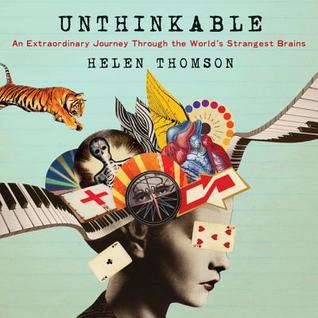Helen Thomson is a science writer with New Scientist, who became fascinated by the human brain, its complexity, and what can happen when that complexity goes wrong. In this book, she recounts her meetings and experiences with people with nine different, unusual brain conditions. This isn't a clinical textbook; it's about Thomson exploring how these conditions affect the lives of the individuals living with them. She also talks about what we've learned about these conditions and their origins, but that's not the main focus, here. The people are. And no matter how strange the conditions are, she always treats these people with respect, not as mere examples of how bizarre humans can be.
Bob is a man with Highly Superior Autobiographical Memory, or HSAM. He can remember every day of his life, back to surprisingly early childhood, in great detail, at least as far as his personal experiences. In other respects, he and other people with HSAM don't have particularly exceptional memory. It's a very rare condition, with perhaps 100 known examples worldwide. It might seem like a kind of superpower, but in practice it isn't. You remember the good things in detail, but also the bad or sad experiences. Bob says even the negative memories can help somewhat, though. When he has negative experiences similar to things that have happened before, he knows it's something he has coped with before. It's not as intimidating.
Tommy is a man who experienced a major personality change after suffering a stroke. He'd had a rough childhood, resulting in a career more on the criminal and sometimes violent side, while sometimes being a rather sweet guy despite all. After his stroke, he changed dramatically--creative, imaginative, overflowing with ideas and poetry, and taking up painting.
Sharon is a woman whose mental map of her world breaks down frequently; she can get lost in her own house. She's had to learn how to cope with this, find her way around, and for many years, hide her problem, because her mother told her it was witchcraft.
Sylvia is profoundly deaf due to an illness, who suffers auditory hallucinations of music constantly playing. Sometimes it's pleasant, sometimes it isn't. Sometimes it's disruptive and intrusive, and the only thing she can do is find a way to create a distraction.
Joel Salinas is a doctor in Boston who has touch synesthesia. He can literally feel his patients' pain. He also feels the emotions of the people near him, and even feels on his own body the touches he sees them experiencing. It's a syndrome that can cause burnout for doctors and nurses who experience it, but so far, he's managed to make it an asset.
I'm barely touching on what Thomson covers, and she makes the people I've mentioned as well as those I haven't real people whose lives and experiences matter. It's highly readable, or listenable, and well worth your time.
I bought this audiobook.

No comments:
Post a Comment